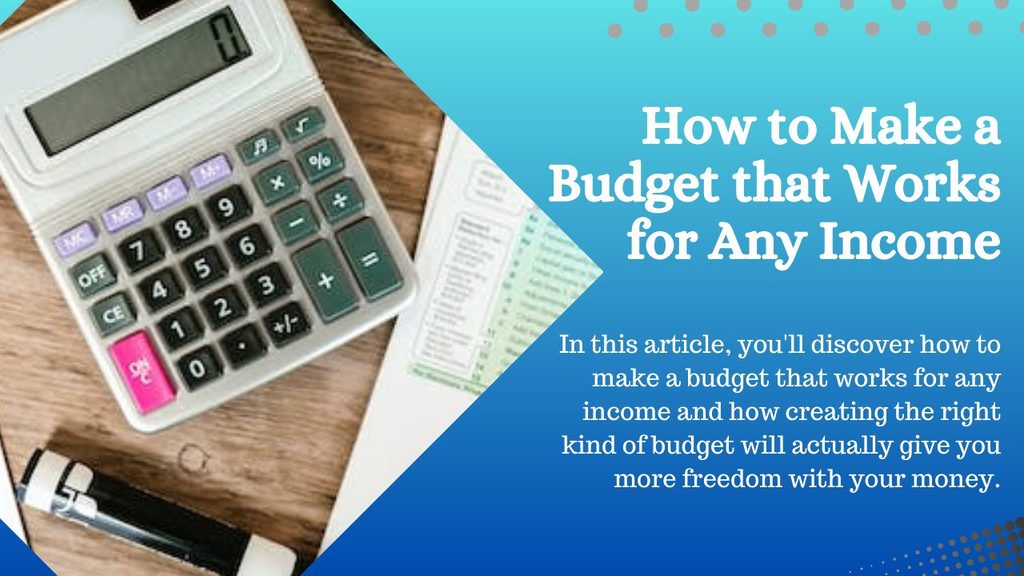How to Make a Budget that Works for Any Income

How to make a budget for your individual situation might seem daunting, but it’s actually much simpler than you would think.
But first off, let’s be clear about things…
I agree with Ramit Sethi that we should be able to spend money on what we want.
And I agree with Grant Cardone that we should save to invest.
A budget, spending money, saving to invest…it all fits together.
In this article, you’ll discover how to make a budget that works for any income and how creating the right kind of budget will actually give you more freedom with your money.
Why Is Having a Budget Important?
“You can’t manage what you don’t measure.”
If you don’t know what’s coming and going, how will you be able to use it how you want, or how will you make it grow?
A budget is important to know what’s happening with your money.
Ramit Sethi in his book “I Will Teach You to Be Rich” says that there are 4 categories to put your money in:
- Fixed costs: rent, utilities, debt, etc.
- Investments
- Savings
- Guilt-free spending money
This keeps things simple as far as budgeting, or what he calls conscious spending.
The point is you need to know what’s going on with your money.
Which leads us to how to make and follow a budget…
What’s the Simplest Way to Make and Follow a Budget?

You might not like this answer, but here it is…
The truth is the budget that works is the one you follow.
It’s that simple.
Just do what works for you. The important thing is that you do it.
One tool that I like to use is Everydollar.com.
There’s a free and a paid version of it and the free version tracks what you spend with credit cards, etc. so you get an accurate idea of where your money is going.
It makes budgeting so much easier.
And by following the formula above of the four categories of your budget, you set yourself up for more freedom.
How Do You Make a Budget for Irregular Income?
For years, I had an irregular income and I couldn’t seem to keep up with my bills when my finances dipped some months.
It was because of that experience that I figured out how to budget for an irregular income.
I know how frustrating and miserable an irregular income can be.
But when you know the “secret sauce” to managing it, it’s not so bad.
So how do you make a budget to compensate?
You have known expenses and unknown expenses, each of which are either regular or irregular.
For example, a common irregular expense is Christmas gifts. We don’t buy those every month.
What you can do is make a list of all your monthly expenses that are known and unknown…
And divide them into regular and irregular categories.
Be sure to add things like Christmas and wedding gifts, medical or vet bills, traffic tickets (better to avoid getting those in the first place, but alas…), or anything else you suspect will creep into your life threatening utter destruction to your budget.
When you have an idea of those things, put them in the four categories mentioned above: fixed expenses, investments, savings, and “mad money”, as some call it.
When you have an idea of your irregular bills and expenses, set a monthly amount you will set aside specifically for those things.
Save for them each and every month. That way you’re prepared when they come around.
Christmas, for example, isn’t a surprise. We know it’s coming in December and can therefore plan for it.
In a Nutshell

To make and use a budget or, in other words, consciously spend, you set yourself up for more financial success and abundance…
Without limiting yourself to a dull, boring life where you don’t spend a dime.
When you follow the budget right for you and your situation, it creates awareness of what’s going on and how you can be more flexible in your spending.
It also gives you more freedom to choose how you will use your money.
If you get to the end of the month without knowing how much you have, it’s a lot harder to spend more money on something you’d like.
But knowing opens the door to say ‘YES’ to that movie with a friend, that last minute road trip, or that investment opportunity.
It opens the door to so many more possibilities that you wouldn’t have without a budget.
If you’re interested in learning more about finances, check out my article 10 Best Personal Finance Books for a Better Relationship with Money.
